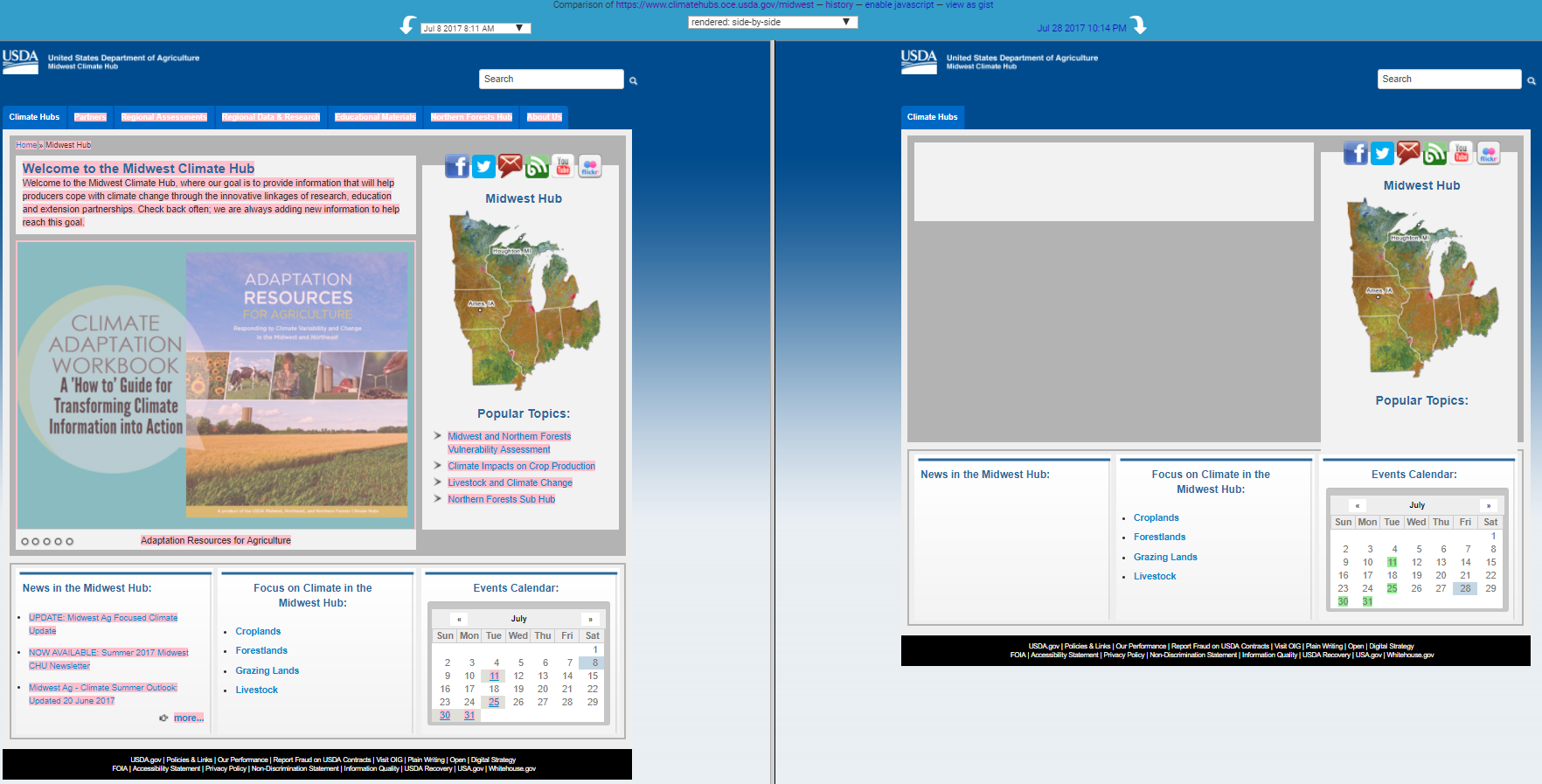By Members of EDGI’s Website Monitoring Committee: Andrew Bergman (@andmbergman), Toly Rinberg, and Gretchen Gehrke (For inquiries, please contact edgi.websitemonitoring@protonmail.com)
August 3, 2017 – Between the evenings of July 27 and July 28, the US Department of Agriculture (USDA) removed substantial portions of its Climate Hubs website, hosted at the URL https://www.climatehubs.oce.usda.gov/. This is how the website’s homepage appeared after the removals. After approximately five days, the removed content was returned on the afternoon of August 2, following media inquiries made with the USDA based on the release of our Website Access Assessment Report [1]. The Climate Hubs website appears to have been restored to the pre-July 27 version, although we have not confirmed that the restored version is identical.
The Climate Hubs were established in February of 2014 to support farmers and the agricultural industry by providing science-based information that could be used to make decisions about how to adapt to and mitigate the risks associated with climate change [2]. As we detail in in our report, there were substantial changes to the Climate Hubs website homepage and the various regional Climate Hub pages (the ”Midwest Climate Hub” page, for example, detailed in our report), as well as to pages and resources that are linked from those pages.

Side-by-side screenshot of a July 8 and July 28 version of the “Midwest Climate Hub” page, demonstrating the removal of content.
Tens of links from the homepage and regional Climate Hub pages were removed and most of the URLs for those removed links led to pages with an “Access Denied” message (like this one). Many of the pages that were removed, such as the “Focus on Croplands” page for the Midwest Climate Hub, contain rich information about the agricultural context and the effects of climate change on the agriculture in the region, often including links to useful resources outside of the federal government’s web domain. The Climate Hubs’ “Tools and Data” page, which was also removed, contains a “Climate Hubs Tool Shed” portal that allows users to search for analytic tools for understanding data, sourced by governmental and non-governmental entities, and links to Data.gov resources. In a few cases, the links that were removed lead to resources that remained available online, like the assessment of climate change vulnerability for the Midwest Climate Hub, but public access to those pages was drastically reduced. Links from the Midwest Hub’s “Regional Data and Research” page that were removed lead to PDFs with data visualizations that were also not available from the removed pages.
The USDA responded to media inquiries by stating that this was a temporary outage due to a technical issue and that they have not made any changes to the website. This removal of content, even if it proved only to be temporary after the website was restored, is nonetheless problematic from a transparency and public access perspective for the following reasons:
- There was no advance notice provided in the form of a statement on the website or a press release, and no notice was provided to website visitors while the content was removed. Even if the site had only been down because of unexpected errors, a notice should have been put in place. If agency officials had been checking the website, even intermittently, the need for such a notice, or for action to restore the website, would have been clear. Moreover, if a substantial overhaul was always what was being planned, a notice would have provided transparency about what was changing, even if the website was never expected to be down.
- Regardless of plans for a website overhaul or a server migration, there is no apparent need for pages to be down. There are a number of ways to launch a new version of a website that would not require website resources to be inaccessible for days. For instance, websites can be hosted on another web domain and tested before they are launched, after which redirects can be put in place.
- There are seemingly no publicly accessible USDA web archives that store this website, which was an issue during the temporary website removals, as users could not access its content, and certainly would also be an issue if the website were overhauled.
References:
[1] The report was initially sent at 4:00 am ET, August 2, 2017 to EDGI’s website monitoring journalist pool with a ~24-hour embargo on its public release.
